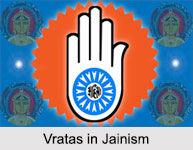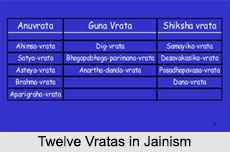 Twelve Vrata in Jainism are a form of self-discipline and are helpful in the practice of right conduct. Right conduct or `Achara` is given prime importance in Jainism as it plays a vital role in shaping the future of mankind. To walk towards right conduct one needs to follow rules laid down, called vows or Vratas. A vow is a sacred promise undertaken willingly by a lay person. It helps us to strengthen our will and avoidance of temptation. They help to avoid influx of karmas and are said to make one"s life peaceful and happy.
Twelve Vrata in Jainism are a form of self-discipline and are helpful in the practice of right conduct. Right conduct or `Achara` is given prime importance in Jainism as it plays a vital role in shaping the future of mankind. To walk towards right conduct one needs to follow rules laid down, called vows or Vratas. A vow is a sacred promise undertaken willingly by a lay person. It helps us to strengthen our will and avoidance of temptation. They help to avoid influx of karmas and are said to make one"s life peaceful and happy.
Division of Twelve Vratas in Jainism
The ethical code of conduct stipulates twelve Vratas or vows for lay person. Twelve Vratas include five Anuvratas, three Guna Vratas and four Siksha Vratas.
Five Anuvratas: The first five Vratas are same as those meant for the ascetics who need to observe them in totality without lapses. Same for lay person are known as "Anuvratas" that needs to be observed partially as per their maximum capacity.
1. Pranatipata Virmana Vrata - Non-violence is the most important vital vow in Jain tradition.
2. Mrusavada Virmana Vrata - Speak without hurting anyone physically, mentally and verbally. It is better to keep silent rather than hurt.
3. Adattadana Virmana Vrata - Stealing away things or property or taking which is not given is renounced in this vow.
4. Maithuna Virmana Vrata - This vow requires one to be chaste, to be absolutely faithful to one"s own wife or husband.
5. Parigraha Parimana Vrata - The 5th vow is to set down limitations on all kinds of possessions.
 Three Guna Vratas: The three Guna Vratas or meritorious or multiplicative vows that assist one to follow the major vows and tend to increase virtues.
Three Guna Vratas: The three Guna Vratas or meritorious or multiplicative vows that assist one to follow the major vows and tend to increase virtues.
6. Dig Vrata - It is a vow to put a control on one"s desires in respect to space thus controlling the area of possible violence.
7. Desa Vrata - In this vow, the aspirant limits his activities of probable violence in terms of space and time both.
8. Anarthadanda Virmana Vrata - This vow means to abstain from all kind of purposeless violence, like digging the ground, uprooting trees, trampling lawns, sprinkling water, plucking leaves, fruits and flowers without reason, or providing instruments such as a knife, poison, fire, plough, sword or a bow.
Four Siksha Vratas: The four Siksha Vratas which are meant for educating the aspirant for higher life of complete renunciation.
9. Samayika Vrata - This vow is to attain equanimity by renouncing attachment and aversion to all worldly objects.
10. Posadhopavasa Vrata - Taking vow to go to a spot like upashraya and stay there like an ascetic especially on ashtamis and chaturdashis. The laity has to also observe fast on these days. It is like preparing one"s self for monkhood.
11. Bhogopabhoga Parimana Vrata - This Vrata entails limitation in the use of objects of Bhoga Upabhoga and thereby helps to reduce attachment as also helps to reduce Himsa to a considerable extent.
12. Atithi Samvibhaga Vrata - It is offering pure food to the ascetics or others before one eats. It also means to share our things even with those who are not known to us.









